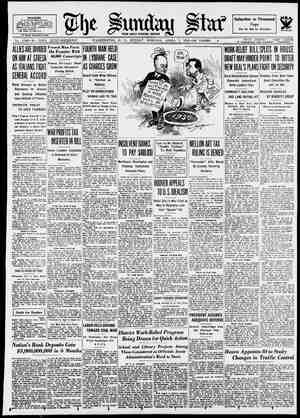Evening Star Newspaper, April 7, 1935, Page 84
You have reached the hourly page view limit. Unlock higher limit to our entire archive!
Subscribers enjoy higher page view limit, downloads, and exclusive features.
4The ‘Town Crier nat’s ALEXANDER W OOLLCOTT new star of the radio and master creator o f modern legends. A friend gives an intimate close-up by JOHN T. WINTERICH N APRIL 6, 1917, the United States entered into a state of war with the Imperial German Government, and on April 6, 1917, Alexander Woollcott may have held a personal parade down Broadway by way of celebration. Whether he actually did or not only Woollcott can say, and I doubt if he ever will. Despite uue_diillmiunmum of the eighteen intes- vening moment, and Woollcott is as responsive to an emctional moment as a tabby is to catnip. 1 am not trying to read any play on words into his designation of himself as town crier. Emotion doesn't have to be slobbery. With Woollcott emotion is an active agent — a kind of sentimental dynamite that impels him to do something about it. In this particular instance he did something about it. He volunteered for privilege (and occasional annoyance) it was to serve with hi how the 33 : % i publisher, has tried to withhold an “1” from him. This is difficult to understand, because in his occasionally tempestuous days as a dramatic critic there were i num- nishing of particulars of Woollcott's career as a member of a hospital unit. He could, of the splendid American Forces was due in no small measure to Woollcott's early transfer to the editorial staff of “The Stars and Stripes,” the -A. E. F.'s own special and particular g When “The Stars and Stripes" was started there was very little A. E. F., and, so far as what there was of the A. E. F. was concerned, almost no war. This comfortable state of through at the Chemin des Dames and reached the Marne in a romp; the name of Chateau-Thierry flamed into deathless fame, Portrait Sketch by Leonebel Jacobs Alexander Woollcott— He deals in life’s hidden dramas into the role of war-correspondent. Both of us started from scratch — it was, as the already moth-eaten A. E. F. gag had it, our first war. For one who had for some time been enjoying the traditional eider-down luxuries of a metro- politan dramatic critic, Woollcott adapted himself as handily as a longshoreman to sleep- ing under the stars with his shoes on while French artillery turned the night into a mis- placed Fourth of July celebration. As the front moved north and east, pressing steadily toward the Rhine, Woollcott (re- garded everywhere as a badly-made-up major-general or a visiting Congressman) panted on in the wake of the doughboy, to which young god in hobnails the staff of “The Stars and Stripes” paid full homage of £ 1 BE i il ;E 3h | E_ 7 it ij & EE : ¢ i 1 : g E : i Sector. Woollcott had his trade and went back to it. _Broadway kaew him again — got to know him THIS WEEK better and to accept his word as the last word. But Broadway is a provincial lane of few turn- of human activity — one or two of them were forecasts of ‘‘While Rome Burns, "’ which book, April 7, 1935 a big map — it's near Wickatunk and Colts Neck. Weight: Not so much as he intimates. jon: Livid when some nitwit asks him: “I read what you wrote (or heard what you said) about such a play or such a book, but what is your honest opinion of it?"’ Disposition: Plenty. Likes to give impres- sion of being a nail-eater, but actually has a heart modelled after Louisa M. Alcott and Florence Nightingale. Consistent but secretive contributor to the support of a regiment of individuals of varying degrees of worthiness or the lack of it. Will pour out tears and funds Education: Hamilton College (hats off to old alma mater, men). dramatist, actor, general surveyor of and commentator on the human scene as exhibited on four continents (he has never been to South America) but first and last, reporter. Has never peddled papers, so cannot be fitted to customary success formula. dogs, however, to some kinds. Favorite composer: Stephen C. Foster. Favorite novelist, dramatist, actor: Only a rusher-in where angels go tiptoe would ask him. But I am willing to go out on a limb and nominate, for the first and last of these jes, the two le:lau——Dickeu
